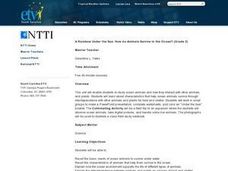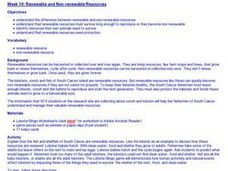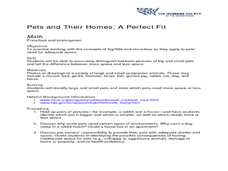Curated OER
Vacancy: Habitats Available!
Sixth graders pick a native animal and write a classified housing ad to match the animal's habitat requirements, paste it on posterboard and then try to match each habitat with the animal it represents.
Curated OER
Basic Needs of Living Things - Lesson Two
Fourth graders study and identify the basic needs of a variety of organisms. Terrariums and aquariums are used to demonstrate what plants, animals, and fish need to stay alive. These two classic models are used to effectively convey what...
Curated OER
Dependence and Interdependence
Third graders explore the dependence and interdependence that plants and animals in every environment have on one another. They examine how plants and animals depend on each other for survival. Students complete a variety of experiments...
Curated OER
Living On Earth
Learners discover the many different animals within various habitats and discover how each individual species interacts with its particular environment. Through charting different animals and their distinct habitat and matching animals...
Curated OER
Exploring Ecosystems
Students examine the relationships between plants, animals, and the environment in ecosystems. They sort animal cards, collect natural materials from the schoolyard, and record an ecosystem web in the form of a poster.
Curated OER
What's That Habitat?
Fourth graders explore the environment by researching animal characteristics. In this habitat identification lesson, 4th graders utilize paper and crayons to illustrate their own habitats or homes and discuss what it contains that is...
Curated OER
Habitat
Fourth graders study the components of a habitat. In this animal habitat lesson, 4th graders define the elements of a habitat. Students discuss intertidal habitats and make a habitat for a crab.
Curated OER
Winer Survival
Students study how animals need water, food, shelter, and space to survive. They also study what animals need to survive in the winter. They play the part of animals and winter "threats" in a game of tag to reinforce concepts.
Curated OER
A Rainbow Under the Sea: How do Animals Survive in the Ocean?
Second graders read books, watch videos, complete worksheets and participate in class discussions about ocean animals. They, in groups, design PowerPoint presentations on selected marine animals.
K12 Reader
Natural Resources
What natural resources are available in your area? Your learners can consider this question after reading a brief passage about natural and renewable resources. After reading, class members respond to five questions related to the reading.
Curated OER
Functional Homes
Young scholars observe and reflect on habitats built and used by various life forms. They discover the benefits of the "homes" to the creature and its life and apply the natural designs to human uses.
Curated OER
What's Wild?
Third graders examine pictures of animals before deciding if it is a wild animal or a domesticated animal. They discuss the difference between the two types of animals, where they live, what they eat, and what they need to survive. Using...
Curated OER
Exploring Habitats
Students analyze the difference between the human habitat and the different habitats of animals in the six lessons of this unit. The students' imaginations and literature are used to explore important aspects of the living environments...
Curated OER
Animal Adaptations
Young scholars expand their knowledge of animal features and behaviors that can help or hinder their survival in a particular habitat. They participate in classroom discussions and visit a website to research animals
Curated OER
Kids for Conservation: Animal Unit
Students discuss animal needs and characteristics. In this animal mini-unit, students complete three activities studying different animals, their needs, how they have evolved, and how to protect them.
Curated OER
Renewable and Non-renewable Resources
Students play Lobster Bingo on a provided worksheet. This game demonstrates how human activities and natral events affect lobsters by impacting their food, clean water, and shelter of the reef.
Curated OER
Animal Alphabet
Second graders identify animals with each letter of the alphabet. In groups, they create a PowerPoint presentation which shows the information they have collected about each one. Using all of this information, they create an animal...
Curated OER
Pets - Stuffed Animal Day
Students listen to Courtney Baker's, "The Perfect Pet," on a day they bring a stuffed animal to school. They graph the types of stuffed animals that their classmates brought to school before answering questions based on the graph. Next,...
Curated OER
Hermit Crabs in the Classroom
Students interact with hermit crabs in the their classroom. In this hermit crab activity, students handle and observe hermit crabs while learning about their habitats and how to treat animals. They watch how the animals move and answer...
Curated OER
Rain Forest Research
Second graders explore the Rain Forest. In this research lesson, 2nd graders go online to gather information about Rain Forest animals. Students print and use the information to write about the many parts of the Rain Forest. Students are...
Curated OER
Amazing Desert Dwellers
Young scholars explore the many adaptations desert animals have made to survive in their challenging habitat. They use this information to invent new creatures well-suited for desert life.
Curated OER
Pets and their Homes
Students explore the space needed for an animal to live in. In this pets lesson, students view pictures of animals and decide which one needs more space or less space to live. Students discuss animals environments and why certain spaces...
Curated OER
Do You Need What I Need?
Student identify the basic human needs. In this life science lesson, 3rd graders compare the needs of plants, animals and humans. They apply what they have learned by playing a survival team game.
Curated OER
Landscaping for Wildlife
Students identify the essential elements needed for promoting wildlife habitat. They describe the terms used in habitat design and the shelter for wildlife. Students explore how to create a pond to support wildlife and how to create a...

























